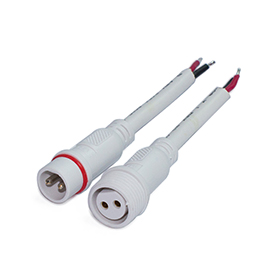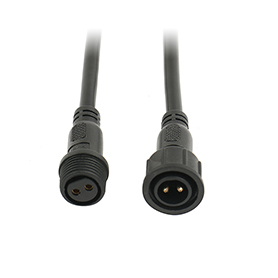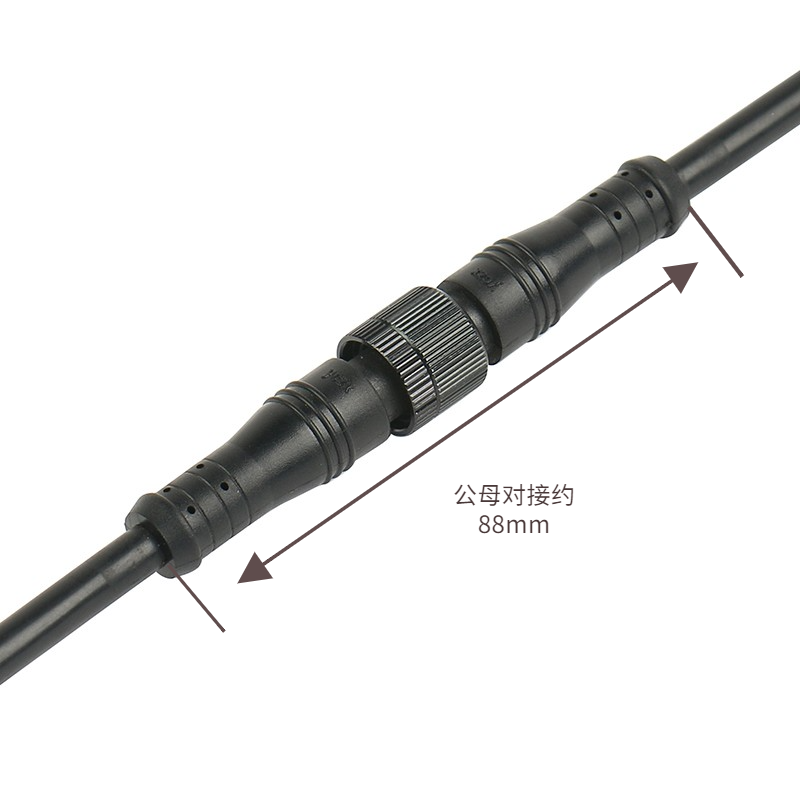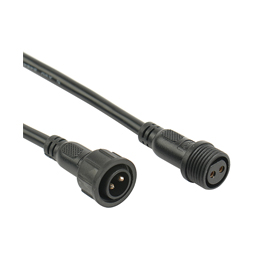News


News

Selection Guide for Waterproof Electrical Connectors: Accurate Matching to Ensure Efficient Operatio
Release time:2024-11-04
viewed:468
In electrical systems, connectors are key components that connect various electronic devices, and their performance directly affects the stability and reliability of the entire system. In some specific application scenarios, such as outdoor equipment, marine engineering, industrial control, etc., waterproof electrical connectors are indispensable. The following will deeply analyze the specific requirements for waterproof electrical connectors in different application scenarios, and provide detailed selection steps and considerations. At the same time, case analysis will be introduced to help readers accurately select waterproof connectors that suit them.

1. IP level
The IP (Ingress Protection) level is an important standard for measuring the waterproof and dustproof performance of electrical connectors. The IP level consists of two numbers, the first number indicates the dustproof level, and the second number indicates the waterproof level. The dustproof level ranges from 0 to 6, and the waterproof level ranges from 0 to 8. The larger the number, the stronger the protection capability.
Outdoor equipment: usually requires IP65 or IP67 rated connectors, which can withstand environmental factors such as rain and dust.
Marine engineering: Due to long-term exposure to salt water, a higher level of waterproof and dustproof capability is required, such as IP68 level, which can be immersed in water for a long time without being affected.
Industrial control: The requirements for waterproof performance are relatively low, but it also needs to have a certain dustproof ability, such as IP54 level, which can prevent splashing water droplets and dust from entering the connector.
2. Material compatibility
The materials of waterproof electrical connectors need to have good corrosion resistance, temperature resistance and aging resistance to adapt to different working environments.
Corrosion resistance: For connectors that are in corrosive environments for a long time, such as marine engineering, it is necessary to select corrosion-resistant materials such as stainless steel and copper alloy.
Temperature resistance: Some connectors working in high or low temperature environments need to choose materials that can withstand extreme temperatures, such as high-temperature nylon, polytetrafluoroethylene, etc.
Aging resistance: Connectors that are exposed to outdoor or harsh environments for a long time need to choose materials with good UV resistance and oxidation resistance, such as silicone rubber, polyvinyl chloride, etc.
3. Working temperature range
The working temperature range of waterproof electrical connectors directly affects their performance and life. Different application scenarios have different requirements for the working temperature of connectors.
Low temperature environment: For example, polar research stations, high mountain meteorological stations, etc., need to choose connectors that can work normally at -40℃ or even lower temperatures.
High temperature environment: such as steel mills, glass manufacturing plants, etc., need to choose connectors that can maintain performance at +80℃ or even higher temperatures.
Normal temperature environment: Most indoor and industrial control occasions have relatively low requirements for the operating temperature of connectors, usually between -20℃ and +60℃.
4. Other special requirements
In addition to the above basic requirements, there may be other special requirements in different application scenarios, such as:
Earthquake resistance: Equipment in earthquake-prone areas needs to choose connectors with good earthquake resistance.
Electromagnetic compatibility: Some equipment that is sensitive to electromagnetic interference needs to choose connectors with electromagnetic shielding function.
Signal transmission requirements: Equipment with high-speed data transmission or high-frequency signal transmission needs to choose connectors with low loss and low noise.

1. Clear application scenarios and requirements
Before selecting, first clarify the application scenarios and requirements, including working environment, working temperature, waterproof level, signal transmission requirements, etc. This information will serve as the basis for selection.
2. Choose the appropriate connection type and structure
According to the application scenario and requirements, choose the appropriate connection type and structure. Common connection types include threaded connection, bayonet connection, push-pull connection, etc.; structural aspects include straight plug-in, bend plug-in, board-mounted, etc. Choosing the right connection type and structure can improve the reliability and ease of use of the connector.
3. Consider material compatibility and corrosion resistance
Choose appropriate material compatibility and corrosion resistance according to the working environment and medium characteristics. For corrosive environments, corrosion-resistant materials such as stainless steel and copper alloy can be selected; for high or low temperature environments, materials that can withstand extreme temperatures need to be selected.
4. Determine the operating temperature and voltage level
Determine the operating temperature and voltage level of the connector according to the application scenario and requirements. Ensure that the connector can operate normally within the specified operating temperature and voltage range to avoid failures such as overheating or breakdown.
5. Consider electromagnetic compatibility and signal transmission requirements
For devices that need to transmit high-speed data or high-frequency signals, it is necessary to select connectors with low loss and low noise, and consider electromagnetic compatibility requirements. Ensure that the connector will not be subject to electromagnetic interference or generate electromagnetic radiation during transmission.
6. Evaluate cost-effectiveness
Evaluate the cost-effectiveness of connectors of different brands and models on the premise of meeting performance requirements. Choosing cost-effective connectors can reduce procurement costs and improve equipment competitiveness.
7. Refer to industry standards and specifications
During the selection process, you can refer to relevant industry standards and specifications, such as IEC, UL, CE, etc. These standards and specifications provide a reliable basis for the performance and quality of connectors, which helps to ensure the accuracy and reliability of selection.

Case 1: Outdoor LED display screen
Application scenario: Outdoor LED display screen needs to be exposed to harsh environments for a long time, including high temperature, low temperature, rain, dust, etc.
Selection logic:
IP level: Select IP65-rated connectors to ensure that they can resist environmental factors such as rain and dust.
Material compatibility: Select high temperature resistant and aging resistant materials, such as polycarbonate, silicone rubber, etc., to adapt to outdoor high temperature and ultraviolet radiation environments.
Connection type and structure: Select threaded connection and plug-in structure to improve the reliability and ease of use of connectors.
Cost-effectiveness: On the premise of meeting performance requirements, select cost-effective connector brands to reduce procurement costs.
Effect: After actual use verification, the waterproof electrical connector can operate stably for a long time without any failure or performance degradation. The brightness and color performance of the LED display are good, which has been highly praised by customers.
Case 2: Marine monitoring equipment
Application scenario: Marine monitoring equipment needs to work in seawater environment for a long time, and has high requirements for waterproof performance and corrosion resistance.
Selection logic:
IP level: Select IP68-rated connectors to ensure that they can be immersed in water for a long time without being affected.
Material compatibility: Select corrosion-resistant materials such as stainless steel and copper alloy to adapt to the corrosiveness of the seawater environment.
Connection type and structure: Select bayonet connection and bent plug structure to facilitate installation and maintenance in narrow spaces.
Operating temperature range: Select connectors that can work normally in the range of -20℃ to +60℃ to adapt to temperature changes in the marine environment.
Effect: The waterproof electrical connector performs well in marine monitoring equipment and can transmit data stably for a long time without any leakage or corrosion. The stability and reliability of the equipment have been significantly improved, providing strong support for marine scientific research.
Case 3: Industrial control system
Application scenario: Industrial control systems need to work in factory environments for a long time, and have certain requirements for dustproof performance and temperature adaptability.
Selection logic:
IP level: Select IP54-rated connectors to ensure that splashing water droplets and dust can be prevented from entering the connector.
Material compatibility: Select high-temperature resistant and aging-resistant materials such as nylon, polyvinyl chloride, etc. to adapt to the high temperature and dust in the factory environment.
Connection type and structure: Select push-pull connection and board-mounted structure to facilitate installation and maintenance in the control cabinet.
Operating temperature range: Select connectors that can work normally in the range of -40℃ to +80℃ to adapt to temperature changes in the factory environment.
Effect: The waterproof electrical connector performs well in industrial control systems and can transmit signals and control instructions stably for a long time without any failure or performance degradation. The stability and reliability of the control system have been significantly improved, providing a strong guarantee for the production efficiency and quality of the factory.

The selection of waterproof electrical connectors is a complex and meticulous process that requires consideration of multiple factors and requirements. By clarifying the application scenarios and requirements, selecting the appropriate connection type and structure, considering material compatibility and corrosion resistance, determining the operating temperature and voltage level, considering electromagnetic compatibility and signal transmission requirements, and evaluating cost-effectiveness, you can accurately select a waterproof connector that suits you. At the same time, referring to industry standards and specifications as well as the selection logic and effects of successful cases can further improve the accuracy and reliability of the selection. I hope that the above content can provide useful reference and help for everyone in the selection process of waterproof electrical connectors.